What is Hair Loss ?
Hair loss, also known as alopecia, refers to the partial or complete loss of hair from areas of the body where it typically grows, most commonly the scalp. It can result from a variety of factors, including genetics, hormonal changes, medical conditions, medications, and lifestyle choices. Hair loss can manifest as thinning, bald patches, or complete baldness and can have a significant impact on a person’s self-esteem and overall well-being. Treatment options for hair loss may include medications, topical treatments, hair transplant surgery, or lifestyle modifications, depending on the underlying cause.
Here 8 Ayurvedic Herbs Extract To Control Hair Fall
1. Mandukparni Extract
Mandukaparni, also known as Centella asiatica or Gotu Kola, is an herb commonly used in traditional medicine systems like Ayurveda. While it’s not typically considered a primary treatment for hair loss, some people believe that it may help control hair fall indirectly through its potential benefits for overall health and wellbeing. Here are a few ways in which Mandukaparni may contribute to hair health:
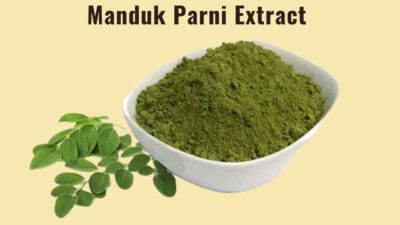
Improved circulation: Mandukaparni is thought to enhance blood circulation, which can potentially improve the delivery of nutrients and oxygen to hair follicles. Better circulation can promote healthier hair growth.
Stress Reduction: Chronic stress is a known contributor to hair loss. Some research suggests that Mandukaparni may have adaptogenic properties, helping the body adapt to stress and potentially reducing its negative impact on hair.
Antioxidant Effects: Mandukaparni contains compounds with antioxidant properties that can help protect hair follicles from damage caused by free radicals. This protection may support the overall health of hair.
Collagen Production: This herb may stimulate collagen production, which is an essential protein for healthy hair growth. Collagen plays a role in strengthening hair and improving its texture.
Hormonal Balance: Mandukaparni may help regulate hormonal imbalances, which can be a factor in hair loss. Hormonal fluctuations, especially those related to thyroid function, can contribute to hair problems.
2. Bhringraj Extract
Bhringraj, scientifically known as Eclipta alba, is an herb commonly used in traditional Ayurvedic medicine for hair care and various health purposes. Bhringraj is believed to be beneficial for controlling hair fall and promoting hair growth due to several potential mechanisms:
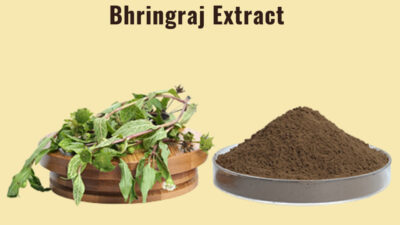
Strengthening Hair Follicles: Bhringraj contains nutrients like vitamins and minerals (e.g., iron, magnesium, calcium) that are essential for maintaining healthy hair follicles. Stronger follicles are less likely to shed hair prematurely.
Improving Blood Circulation: Massaging Bhringraj oil or a Bhringraj-infused hair oil onto the scalp can help improve blood circulation to the hair follicles. This increased blood flow delivers more oxygen and nutrients to the hair roots, promoting healthier and stronger hair.
Reducing Scalp Inflammation: Bhringraj has anti-inflammatory properties that can help soothe an inflamed scalp. Scalp inflammation is often associated with hair loss, so reducing it can be beneficial in controlling hair fall.
Preventing Premature Graying: Bhringraj is also believed to prevent premature graying of hair. While not directly related to hair loss, maintaining the natural color of your hair can contribute to its overall appearance and perceived health.
Balancing Oil Production: Bhringraj may help regulate sebum production on the scalp. Excessive oiliness or dryness of the scalp can contribute to hair problems, and Bhringraj’s potential ability to balance this can be beneficial.
Antioxidant Effects: The herb contains antioxidants that can protect the hair follicles from oxidative stress and damage caused by free radicals, which can weaken hair and lead to hair fall.
3. Amla Extract
Amla, also known as Indian gooseberry or Emblica officinalis, is a fruit that has been traditionally used in Ayurvedic medicine for its numerous health benefits, including its potential role in controlling hair fall. Here are several ways in which Amla may help with hair loss:
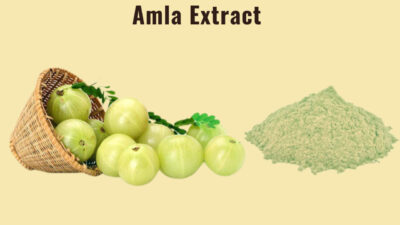
Rich in Vitamin C: Amla is exceptionally high in vitamin C, which is a powerful antioxidant. Antioxidants help protect hair follicles from damage caused by free radicals, which can contribute to hair fall.
Promotes Hair Growth: Amla contains essential nutrients that are beneficial for hair growth, such as iron, calcium, and various vitamins. These nutrients can nourish the hair follicles, strengthen the hair shafts, and encourage healthy hair growth.
Strengthens Hair: Amla can strengthen the hair from the roots, making it less prone to breakage and fall. It may also help improve hair texture and thickness.
Balances pH Levels: Amla has a mildly acidic pH, which can help balance the pH of the scalp. An optimal pH level can create a healthy environment for hair growth and prevent scalp issues that contribute to hair loss.
Dandruff and Scalp Health: Amla has anti-inflammatory and antimicrobial properties, which can help soothe an irritated or itchy scalp.
Prevents Premature Graying: Some traditional uses of Amla suggest that it can slow down the premature graying of hair. While this is not directly related to hair fall, maintaining natural hair color can contribute to overall hair health.
Improved Blood Circulation: Massaging Amla oil or Amla-infused hair products onto the scalp can improve blood circulation, ensuring that the hair follicles receive an adequate supply of nutrients and oxygen.
Amla can be consumed as part of your diet or applied topically to the hair and scalp in various forms, such as Amla oil, Amla powder, or as an ingredient in hair care products. While Amla is generally considered safe, individual responses may vary. It’s essential to incorporate it into your hair care routine consistently for potential benefits.
4. Giloy Extract
Giloy, scientifically known as Tinospora cordifolia, is an herb commonly used in traditional Ayurvedic medicine for its potential health benefits. While Giloy is not typically associated with controlling hair fall directly, it can contribute to overall well-being, which in turn may have an indirect impact on hair health. Here are some ways in which Giloy may help promote healthier hair:
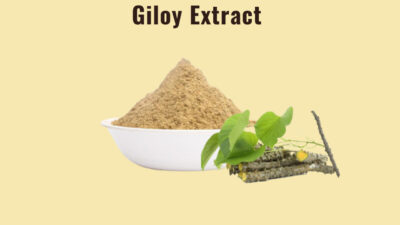
Boosting Immune System: Giloy is known for its immunomodulatory properties, meaning it can help regulate and strengthen the immune system. A strong immune system can support overall health and may indirectly benefit hair health by preventing conditions that can lead to hair loss, such as infections or autoimmune disorders.
Reducing Stress: Chronic stress is a common contributor to hair loss. Giloy may have adaptogenic properties, which means it could help the body adapt to stress and reduce its negative impact on hair health.
Anti-Inflammatory Effects: Giloy possesses anti-inflammatory properties, which can help reduce inflammation in the scalp. Scalp inflammation can contribute to hair problems, including hair fall.
Detoxification: Giloy is believed to have detoxifying properties. By helping the body eliminate toxins, it may create a healthier internal environment that supports hair growth.
Antioxidant Properties: The herb contains antioxidants that can protect hair follicles from oxidative stress and damage caused by free radicals. This protection can help maintain healthy hair.
While Giloy may offer some potential benefits for overall health, including hair health, it’s important to note that scientific research specifically on its effectiveness for controlling hair fall is limited. Hair loss can have various causes, including genetics, hormonal imbalances, medical conditions, and more. Therefore, it’s essential to address the underlying cause of hair loss to develop an effective treatment plan.
5. Yastimadhu Extract
Yastimadhu, also known as Licorice or Glycyrrhiza glabra, is an herb that has been used in traditional medicine systems like Ayurveda for its potential health benefits. While it’s not typically considered a primary treatment for hair loss, Yastimadhu may contribute to hair health and help control hair fall through the following mechanisms:
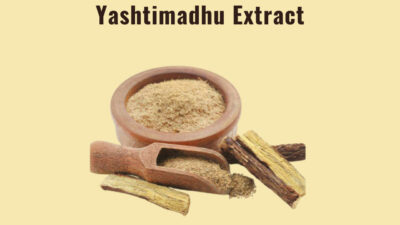
Anti-Inflammatory Properties: Yastimadhu contains compounds with anti-inflammatory properties. If scalp inflammation is contributing to hair loss, Yastimadhu may help reduce this inflammation, creating a more favorable environment for hair growth.
Scalp Soothing: The soothing and calming properties of Yastimadhu can relieve itching and irritation on the scalp, which can be beneficial for individuals with dandruff or other scalp conditions that may lead to hair loss.
Moisturization: Yastimadhu can help moisturize the scalp, preventing dryness and flakiness. A well-hydrated scalp is essential for healthy hair growth.
Balancing Oil Production: It may also help regulate sebum production on the scalp. Excessive oiliness or dryness can contribute to hair problems, and Yastimadhu’s potential ability to balance this can be helpful.
Hair Strengthening: Yastimadhu contains certain nutrients and compounds that can strengthen hair from the roots, making it less prone to breakage and fall.
Antioxidant Effects: The herb has antioxidant properties that can protect hair follicles from oxidative stress and damage caused by free radicals. This protection can help maintain healthy hair.
Hormonal Balance: Some studies suggest that Yastimadhu may have hormonal-modulating effects. Hormonal imbalances can contribute to hair loss, and regulating hormones may help control hair fall.
6. Brahmi Extract
Brahmi, scientifically known as Bacopa monnieri, is an herb with a long history of use in traditional medicine systems like Ayurveda. While it’s not typically considered a primary treatment for hair loss, Brahmi may contribute to overall hair health and help control hair fall through several potential mechanisms:
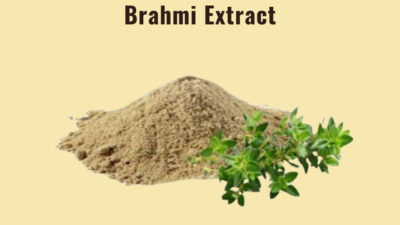
Improved Blood Circulation: Massaging Brahmi oil or using Brahmi-infused hair products on the scalp can help improve blood circulation to the hair follicles. Enhanced blood flow ensures that hair follicles receive an adequate supply of nutrients and oxygen, promoting healthier hair growth.
Reduction of Scalp Irritation: Brahmi has soothing and calming properties, which can help alleviate itching, irritation, and inflammation on the scalp. A calm and irritation-free scalp is essential for preventing hair loss.
Stress Reduction: Chronic stress is a known contributor to hair loss. Brahmi is often considered an adaptogen, which means it may help the body adapt to stress and reduce its negative impact on hair health.
Antioxidant Effects: Brahmi contains antioxidants that can protect hair follicles from oxidative stress and damage caused by free radicals. This protection can help maintain healthy hair.
Improved Hair Texture: Regular use of Brahmi can strengthen the hair shafts, making them less prone to breakage and fall. It may also enhance the texture and thickness of the hair.
Hair Conditioning: Brahmi has moisturizing properties that can help condition the hair, preventing dryness and promoting shine. Balancing Oil Production: It may help regulate sebum production on the scalp. An optimal balance of oiliness can contribute to hair health.
7. Aloevera Extract
Aloe vera is a well-known plant that has been used for centuries for its potential health and beauty benefits, including its role in promoting hair health and controlling hair fall. Here are several ways in which aloe vera may help in this regard:
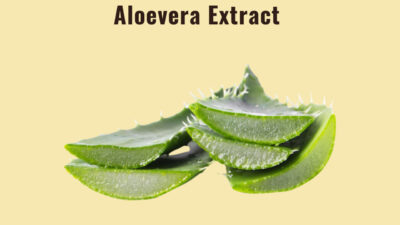
Scalp Health: Aloe vera has anti-inflammatory and antimicrobial properties, which can help soothe an irritated or inflamed scalp. A healthy, balanced scalp is crucial for preventing hair fall.
Moisturization: Aloe vera is hydrating and can provide moisture to the scalp and hair, preventing dryness and flakiness.
Reducing Dandruff: Aloe vera’s antimicrobial properties may help reduce dandruff, a common scalp condition that can lead to hair fall when left untreated.
Strengthening Hair: Aloe vera contains essential vitamins, minerals, and amino acids that can strengthen the hair from the roots, making it less prone to breakage and fall.
Balancing pH Levels: Aloe vera has a mildly acidic pH level that is close to the natural pH of the scalp. Applying aloe vera gel can help balance the pH of the scalp, creating a more favorable environment for hair growth.
Promoting Blood Circulation: Massaging aloe vera gel onto the scalp can stimulate blood circulation. Improved blood flow ensures that hair follicles receive adequate nutrients and oxygen, supporting healthy hair growth.
Protection from Environmental Damage: Aloe vera contains antioxidants that can protect the hair and scalp from damage caused by environmental pollutants and UV radiation.
Hair Conditioning: Aloe vera can leave the hair feeling soft, smooth, and manageable, promoting a healthier appearance.
To use aloe vera for hair health, you can apply the gel directly to your scalp and hair as a mask or conditioner. You can also find commercial hair care products that contain aloe vera as an ingredient.
While aloe vera can be beneficial for many people in maintaining scalp and hair health, individual responses may vary. It’s important to note that aloe vera is not a guaranteed solution for severe or underlying causes of hair loss. If you’re experiencing significant hair loss or have concerns about your hair health, it’s advisable to consult with a healthcare professional or dermatologist. They can provide a thorough evaluation, diagnose any underlying causes of hair loss, and recommend appropriate treatments or remedies tailored to your specific needs.
8. Ashwagandha Extract
Ashwagandha (Withania somnifera) is an adaptogenic herb that has been traditionally used in Ayurvedic medicine for its potential health benefits. While it’s not typically considered a primary treatment for hair loss, Ashwagandha may indirectly help control hair fall by addressing underlying factors that can contribute to hair problems. Here are several ways in which Ashwagandha may support hair health:
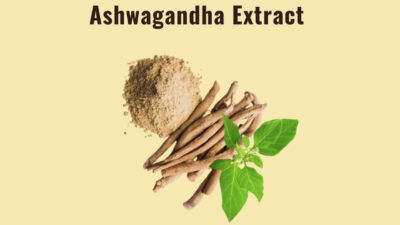
Stress Reduction: Chronic stress is a known contributor to hair loss. Ashwagandha is recognized for its adaptogenic properties, meaning it may help the body adapt to stress and reduce its negative impact on hair health.
Hormonal Balance: Hormonal imbalances, particularly fluctuations in cortisol and thyroid hormones, can lead to hair loss. Ashwagandha may have a role in balancing these hormones, potentially addressing one of the underlying causes of hair fall.
Improving Sleep: Adequate sleep is essential for overall health and well-being, including hair health. Ashwagandha has been used traditionally to promote better sleep quality and may indirectly support hair growth by ensuring you get enough restorative sleep.
Enhancing Immune Function: A healthy immune system can help prevent scalp infections and conditions that contribute to hair loss. Ashwagandha is believed to have immunomodulatory properties that can support immune function.
Reducing Inflammation: Chronic inflammation in the scalp can lead to hair problems, including hair fall. Ashwagandha’s anti-inflammatory properties may help reduce scalp inflammation.
Antioxidant Effects: Ashwagandha contains antioxidants that can protect hair follicles from oxidative stress and damage caused by free radicals. This protection can help maintain healthy hair.


